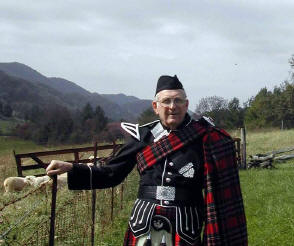|
 September 30, 2003 September 30, 2003
Dear Editor,
The unidentified piper pictured on page 21 of Section A The Family
Tree August/September 2003 - Volume XIII Number 4, is my husband!
What a surprise to see him in The Family Tree!
He is Edwin S. Robinson, Pipe Major of the Southwest
Virginia Highland Pipes and Drums, and we live at 6676 Blacksburg
Road, Catawba, Virginia 24070-2512.
I have attached an article which describes an
experience Ed had last summer while piping at the committal of a
firefighter. It was a very moving experience and it illustrated
the connection that exists between Scots and Native Americans.
I request that you consider my article for
publication. I will be happy to supply another photo of Ed if
needed.
Thank you very much.
Sincerely,
Valarie K. Robinson
6676 Blacksburg Road
Catawba, VA 24070-2512
esrobinson@vt.edu
(540) 384-7241
And here is the article...
A PIPER
SUMMONS THE SPIRITS
( by Valarie K. Robinson)
My bagpiper
husband had an ethereal experience last week.
He was hired
to play at the committal of a fallen firefighter from a small
Virginia town where this beloved, vibrant man had succumbed to an
attack of flesh-eating bacteria, a devastating blow which was very
quickly fatal. He was 57 years old.
Dozens of
fire engines and other vehicles had gathered for the funeral by the
time my husband Ed arrived . The chapel overflowed with firefighters
and grieving community members.
The service
was poignant. It began as expected but lengthened as the preacher
expressed the communal grief which this death had evoked. Some
mourners offered remarks.
As the
ceremony went on, Ed decided to ask the funeral director for
directions to the cemetery where he was to play and was invited to
follow the flower car. It was apparent that it would take a long
while for all of the firefighters and other mourners to reach the
site, there was such a crowd.
The deceased
was to be carried in an antique fire engine in use as a hearse, a
very moving touch.
So Ed left,
following the flower car up hill and down , along country lanes
surrounded by pastures, in the shadow of mountains, on and on. He
said he thought he'd never been in such a remote part of Virginia
and knew that the fire trucks would take a long time to wend their
way. He meandered along in the midst of lush green countryside and
soft mountains which comfort a passerby by their presence.
It was an
exquisite day with a gentle breeze , not too hot, not too cold.
Eventually
the country cemetery appeared on a ridge all by itself, very small
and surrounded by a fence.
Upon settling
himself down by the small cemetery Ed decided to warm up his bagpipe
and await the funeral procession.
He played
several tunes in the peaceful solitude.
Soon two
mortuary workers who'd been unobtrusively off to the side approached
and said that bagpipe music sounds like Native American flute music.
Ed asked,
"Are you Native Americans? “
"Yes, I am
Cherokee, from this area".
And, "I am
Lakota, from South Dakota."
Conversation
followed. The listeners commented that ancient Scots and Native
Americans had much in common including the fact that they both
painted their faces before they went into battle.
The Cherokee
mentioned that he had heard a piper at a funeral in a nearby town,
in fact the one where Ed's university is located.
He went on to
say that an eagle had appeared and circled overhead as that piper
played, and this was very significant, very important.
Ed agreed,
knowing that the eagle is a powerful creature in Native American
beliefs who is in direct contact with the Great Spirit as he soars
overhead. The presence of an eagle was impressive, rare and
moreover, astonishing that he should respond to pipe music.
Their
conversation was interrupted at this point by the arrival of the
antique fire engine at the head of the long funeral procession. The
burial rites were about to begin. It was time for Ed to play.
As the
pallbearers shouldered the casket Ed struck up "My Home is in the
Cold, Cold Ground" and led them from the fire engine to the
graveside where the mourners waited for the final service to begin.
The casket was placed at the graveside and Ed stepped off to the
side, silent.
It was time
for the preacher's final blessings and prayers.
Finally, to
mark the last stage of this sad journey, Ed played "Amazing Grace"
several times, walking slowly from the canopied area to a place
apart from the mourners. He played while the family and friends
exchanged remarks and then prepared to leave their loved one in the
country cemetery.
The Cherokee
and Lakota approached Ed once again, after the bagpipe music ended.
The Cherokee
asked Ed,
"Did you see
the eagle that was circling overhead as you played just now?"
Pause.
"He came to
bring you honor."
Silence.
Ed knew then
that as he was honoring the fallen firefighter he was being honored
himself.
An eagle had
appeared in response to his music.
And later
that evening his eyes glistened as he recounted his experience to
me, and my eyes glistened in response. |

